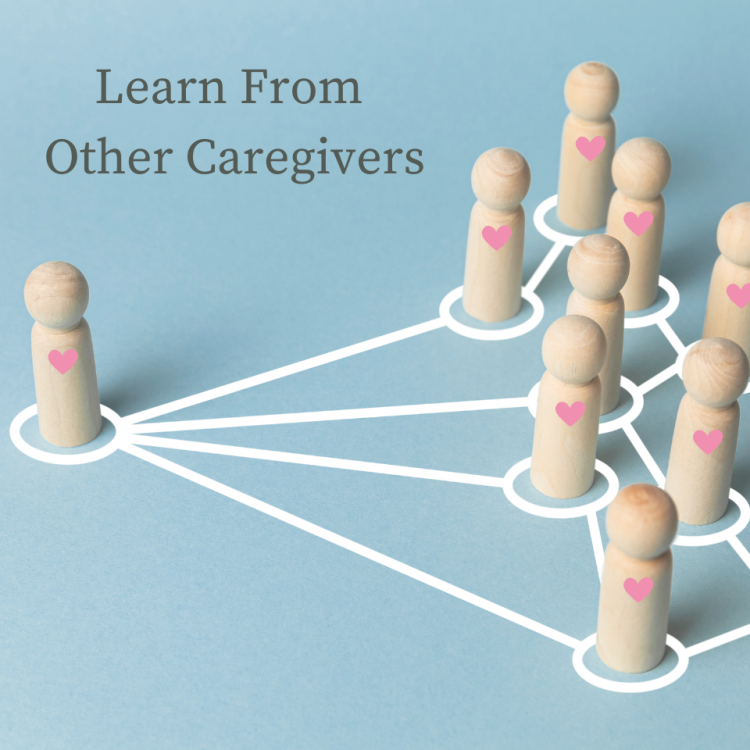When you become a caregiver, learning from others plays a critical part in how effective you will be. It provides insight into challenges you’re likely to encounter and much-needed solutions or perspectives. In the end, it all benefits your loved one’s health and well-being, as well as your relationship with each other.
Caregiving books, websites, and organizations are all valuable resources. But lessons learned from other caregivers are also incredibly useful. Here you will find a roundup of some firsthand, powerful caregiving stories from around the web that will hopefully make your journey easier.
![]() On Boundaries
On Boundaries
“Honoring your loved one’s wishes doesn’t mean you have to give up your own boundaries.” — Lauren Krouse
In an article for Prevention, writer Lauren Krouse shares lessons she learned about caregiving after moving from North Carolina to Virginia to become her grandmother’s live-in caregiver.
![]() “She has a right to her anger – respect it.” — Patricia M. Annino
“She has a right to her anger – respect it.” — Patricia M. Annino
As much as you care about your loved one and want to help them, you cannot fully understand everything they are going through as they age. It’s especially so if they have a condition such as Alzheimer’s.
In a story for the Cleveland Clinic’s Women’s Alzheimer’s Movement, Annino, who is caring for her grandmother who has the condition, provides a good reminder to caregivers to allow their elderly loved ones to feel and honour their emotions and thoughts. They should also be allowed to share them without fear of judgment or rejection.
![]() On Recharging
On Recharging
“You and the person you care for both need time away from one another.” — Lauren Krouse
Sometimes caregivers might feel anxious or even guilty about leaving their elderly loved one alone. But as Krouse points out, it is essential for both of you. Every one of us needs space at some point. Use that time and distance apart to focus on other areas of your life, including yourself and other important people in your life.
![]() On Adapting
On Adapting
“There’s a tremendous amount of adjustment that needs to go on mentally.” — Dana Reeve
When you first become a caregiver, it can be a bit like being adrift at sea with no compass. There is so much to learn, you don’t want to make the wrong decisions and you are trying to stay afloat in your own personal life as well.
Dana Reeve is the wife of Christopher Reeve, most well-known for his role as Superman. She became his long-time caregiver after he was paralyzed following a riding accident. Before she passed away in 2006, she talked about facing the new normal in a post for the family’s foundation. And that is powerful advice.
If there is one thing you will learn as a caregiver is that there is no going back to what once was. Accepting that is vital to how effective you are as a caregiver and to whether you see it as a positive or negative experience.
![]() On Preconceptions
On Preconceptions
Step away from what you feel you should know and embrace what makes sense for your reality. — Brenda Joy Eastman
As Eastman points out in her story for Reflections: Narratives of Professional Helping, no two caregiving journeys are the same. Strategies, insights, and solutions provide a framework for your role. But they are not written in stone.
As you continue on your day-to-day caregiving responsibilities, take the time to assess what is working and what isn’t. Don’t be tied to assumptions about what should be happening. Honour and rely on your own experience.
![]() On Flexibility and Preparedness
On Flexibility and Preparedness
“Prepare to miss work.” — Working Daughter
Workplace absenteeism is one of the biggest consequences of becoming a caregiver. In Canada, 40 percent of family caregivers miss work, and 15 percent work reduced hours.
In a post on Working Daughter, a reader shares her recommendations on being ready for the inevitability of missing work. Some of her suggestions include creating a system so that work continues to be done in your absence and asking your manager for a buddy at work who will act as backup. She also recommends putting certain information on the server so others can have access to it when you are gone.
![]() On Superhero Syndrome
On Superhero Syndrome
“It’s not your job to make everyone else comfortable all the time.” — Anne Tumlinson
Many caregivers have fallen into the “superhero syndrome” trap. In recent years, images of caregivers wearing superhero costumes have even gone viral. But this can be a slippery slope.
Family caregivers often have an instinct to want to help, comfort and give and give some more. Many are also part of the sandwich generation family and take this same approach with their own family. It can be draining and stressful. And, in the end, who’s comforting and caring for the caregiver?
As Tumlinson explains in her post on Daughterhood, helping out or solving problems when you don’t have to is enabling. It’s OK to distinguish which problems are yours to solve and to allow others to tackle problems they are capable of solving. It’s all part of setting boundaries as a caregiver.
What Lessons Have You Learned?
What advice, information or experiences have made a profound difference in your being a caregiver? Share them with others in the comments below.

